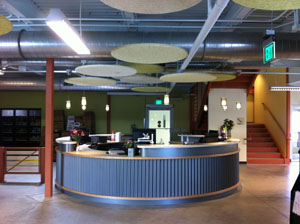Metro Caring Relief Center Opens to the Public in Denver
The new Metro Caring Hunger Relief Center in Denver’s North Capitol Hill neighborhood has been serving clients since mid-March, but its “official” opening in late April was a celebration for the community, volunteers and supporters.


At 16,000 sq ft, the new building is triple the size of the old one, a deteriorating structure built in the 1950s. The Hunger Relief Center and an expanded parking lot are located at 1100 E. 18th Avenue, the site of the old structure.
The design by Denver’s Barker Rinker Seacat Architecture puts the accent on bright colors, plenty of windows, durable materials and an easy-to-navigate circulation system.
The first floor includes a reception desk, a waiting area, private offices for consultations with clients, a warehouse space that looks like a mini-Costco, and a market area for food “shopping” that offers predominantly fresh food and resembles a grocery store.
The second floor houses staff offices, training rooms and a demonstration kitchen, with a deck off the kitchen lined by planters for growing herbs and vegetables. A greenhouse, donated by the Nexus Corp., also will provide food that can be distributed to clients and sold to area restaurants.
GH Phipps Construction Cos. built the project for the nonprofit, formerly known as Metro CareRing. Phipps began an affiliation with Metro Caring more than two years ago while the nonprofit raised more than $5 million for the $3.5-million project. The company has supported Metro Caring through donations and time volunteered by employees.
“This building is paid for,” said Executive Director Lynne Butler.
Metro Caring is now serving just under 100 families a day and working to increase that to 125. The organization also helps clients learn to budget their money, pay utility bills through Energy Outreach Colorado, obtain IDs through the Colorado Collaborative ID Project and find medical care and job training in order to live a self-sustaining life.



